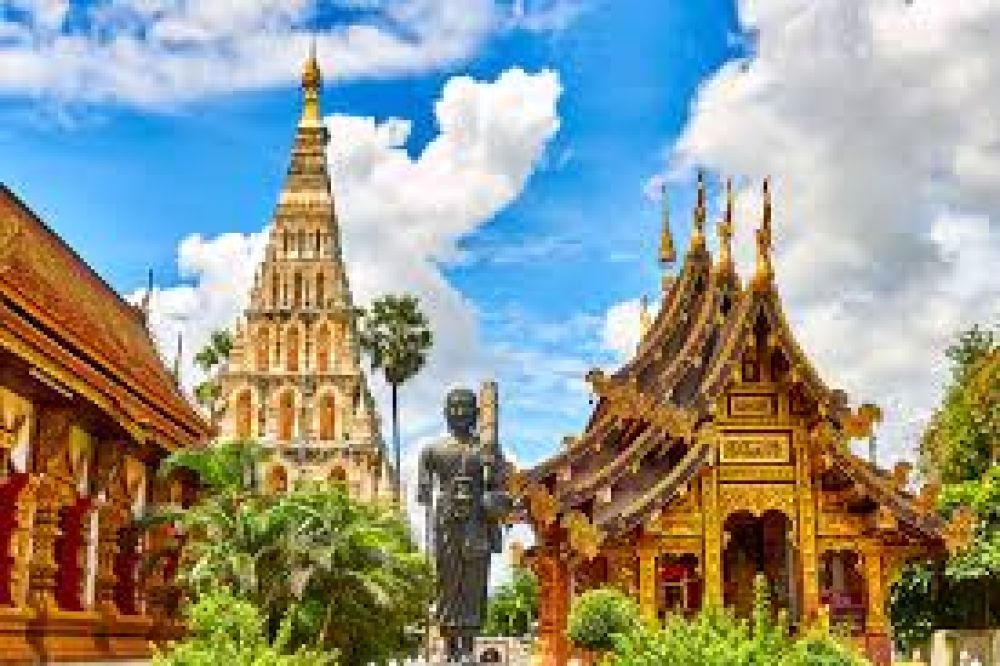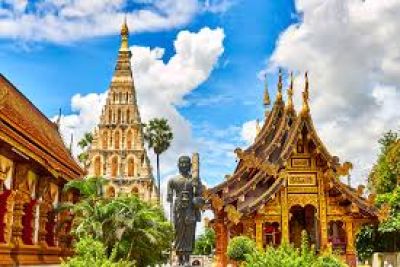

Wiang Kum Kam is an ancient city located on the outskirts of Chiang Mai, Thailand. It is an important historical site that predates Chiang Mai and was believed to have been established in the 13th Century by King Mangrai as his capital before the establishment of Chiang Mai. Visitors can explore the remains of ancient temple ruins, Buddhist sculptures, and pottery shards that provide a glimpse into the area's historical significance. The site highlights the ancient Lanna culture, offering insight into the architectural styles and religious beliefs of the time. A guided tour typically involves a leisurely excursion around the site, often facilitated by carriage rides, bicycles, or electric cars. Historical buffs and culture enthusiasts will appreciate the insightful commentary provided by knowledgeable guides.
Embrace the opportunity to engage in a traditional craft with a hands-on pottery making experience in Wiang Kum Kam. This activity invites participants to learn the art of pottery from skilled local artisans. You’ll delve into the process of clay preparation, shaping, and decorating using techniques that have been passed down through generations. It's a creative and therapeutic way to spend your time, and you get to take home a unique souvenir crafted by your own hands. Sessions are suitable for both adults and children, and no prior experience is required, making it an engaging activity for families or individuals looking to immerse themselves in local handicraft traditions.
The charming and relaxed pace of a horse-drawn carriage ride through Wiang Kum Kam offers a unique way to see this ancient city. The traditional carriages, pulled by well-cared-for horses, add a touch of romance and nostalgia to the journey. As the carriage ambles along the old city’s streets, guests can admire the mix of ruins and nature, including tropical vegetation and the ancient architecture of bygone eras. The clippety-clop of the horse's hooves and the absence of modern vehicles allow for a tranquil exploration of the site. Carriage drivers often share stories of the area's history, pointing out significant ruins and landmarks along the way.
Renting a bicycle and touring the temples of Wiang Kum Kam is a delightful way to experience the area's rich heritage. Cyclists can set their own pace, stopping at various temple sites to explore them in detail. The temples, or 'wats,' feature an array of architectural styles, from elegant chedis to intricate stonework, which stand as testament to the craftsmanship and cultural significance of the Lanna Kingdom. Signage at some of the temples explains their history, contributing to an educational ride. Bicycling also offers the benefit of physical exercise and the ability to enjoy the pleasant Chiang Mai weather, making it a popular choice for those looking to combine outdoor activity with cultural exploration.
Thailand is world-renowned for its culinary delights, and Wiang Kum Kam is no exception. A food tasting tour in this area will take visitors on a gastronomic adventure, where they can sample an array of northern Thai dishes, such as khao soi (creamy coconut curry noodle soup), sai oua (spicy Chiang Mai sausage), and sticky rice with mango. This activity not only tantalizes the taste buds but also offers an understanding of the local culture and how traditional Lanna food is prepared and enjoyed. Visitors can stop at various local eateries or market stalls, learning from the vendors and perhaps even picking up a recipe or two to try at home.
Wiang Kum Kam offers a serene setting for those seeking spiritual replenishment through meditation. Several local monasteries host meditation retreats, ranging from a few hours to several days, suitable for both beginners and experienced meditators. Participants will learn techniques of Vipassana (insight meditation) or other forms of mindfulness practices from experienced monks. Retreats usually include sitting and walking meditation sessions, discussions on Buddhist philosophy, and techniques for integrating mindfulness into daily life. This can be a deeply rewarding experience, offering not just relaxation but also a profound understanding of inner peace.
Lantern making is an art form in Northern Thailand, particularly associated with festivals such as Yi Peng and Loy Krathong. Visitors to Wiang Kum Kam can participate in workshops that teach the delicate craft of making traditional Thai lanterns. The workshops are typically run by local artisans who provide step-by-step instruction in creating these beautiful symbols of light and hope. Participants can choose from various designs and are encouraged to add their personal touch to their lanterns. This activity not only leaves one with a wonderful handcrafted souvenir but also offers an insight into local customs and the significance of lanterns in Thai culture.
Experience the magic of Wiang Kum Kam under the soft glow of evening light with a tuk-tuk tour. These three-wheeled motorized rickshaws offer a fun and authentic way to travel around the city. An evening tour provides a different perspective of the area as you zip through the fresh, cool night air. The guide, often the tuk-tuk driver, can whisk you away to see the illuminated ruins and local neighborhoods, making stops at some of the area’s night markets or food streets where you can indulge in delicious street food. It’s a lively way to experience local nightlife while enjoying the convenience of being chauffeured from one point of interest to another.
Taking a walking tour of Wiang Kum Kam is an excellent way for history enthusiasts to connect with the past on a personal level. A knowledgeable guide will lead you through the historic streets, sharing stories of the rise and fall of this once-thriving ancient city. You’ll learn about the various kings and dynasties that left their mark here, as well as the devastating floods that led to the city's abandonment. Physical landmarks, from remaining stonework and earthworks to restoration efforts, will be highlighted, offering tangible encounters with history.
Though known for its ancient ruins, Wiang Kum Kam also boasts a variety of cultural institutions that showcase the creativity of the region. Art galleries exhibit works by local artists, ranging from traditional Thai styles to contemporary pieces. These spaces provide a platform for understanding the modern cultural expressions of Chiang Mai's residents. In addition, visits to cultural centers may include interactive experiences, such as traditional dance performances or music recitals, deepening visitors' appreciation of the area's artistic heritage.
